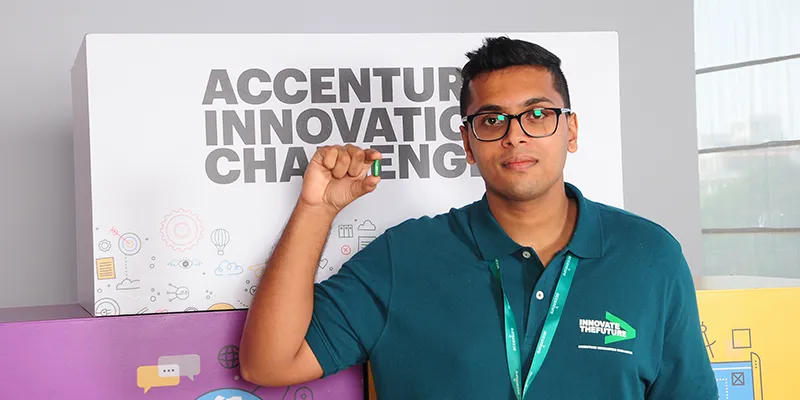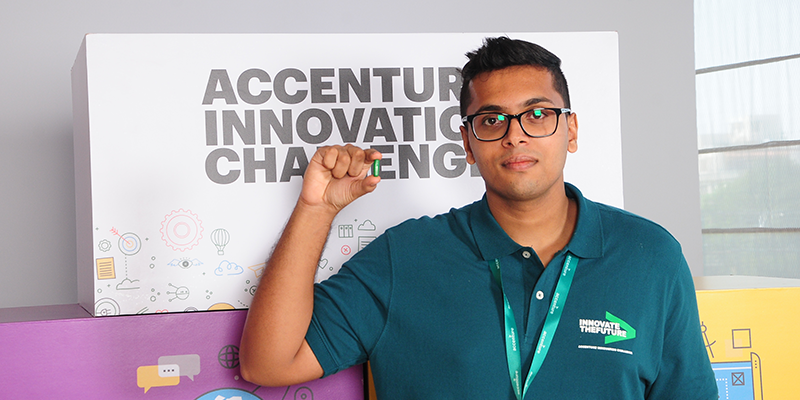Warning: you're going to have a heart attack. This electronic pill promises to give you an early alert
Developed by two engineering students and currently undergoing clinical testing, the electronic pill prototype - Aayush - can predict a heart attack 9-11 minutes before an incident and help save lives.
To cite a cliché, prevention is better than cure. And when prevention may not be an option, to be forewarned is forearmed. Cardiovascular disease is among the leading causes of death in India and while there is a lot of research going on in the field, there is always scope for more.
Enter Nihal Konan, an engineering student from Sir M Visvesvaraya Institute of Technology, Bengaluru. Deeply affected by the death of two family members following a heart attack, he decided to do something about it. This, he says, led to his invention - a digestible electronic pill that gives an early warning of an impending heart attack to patients.
Nihal graduated just this year, but he and batchmate Pujari Kiran Sai spent the last four years developing the electronic pill - Aayush.
The electronic pill is embedded with ingestible micro-sized biomedical sensors. When it enters the body, it breaks apart and releases the embedded integrated circuit (IC) chip. The built-in, virtual assistant has the ability to predict a heart attack 9-11 minutes prior to an incident. It sends alerts to the nearest hospital and to family members via GPS.

Nihal and Pujari took guidance from their college professor, who became their mentor, two specialist surgeons, and also got valuable inputs from the Indian Institute of Science (IISc) to develop the prototype, which took around two-and-a-half years.
Currently in the clinical testing stage, the electronic pill has the potential to be a game changer for the healthcare industry, if approved.
“I had an idea but did not know how to go about it, so I started researching,” recalls Nihal.
Developing the electronic pill combined the elements of physical sciences, and the need to be placed in an extremely complex system – the human body. Nihal says their research went into each minor detail as the project was inter-disciplinary.
Nihal received some funding from the Visvesvaraya University, and the electronic pill prototype has already bagged 12 awards, which brought in some more funds and a lot more goodwill.
The prototype – how it works
The ingestible electronic pill can record metrics such as pH levels, body temperature, heart rate and myeloperoxidase (MPO) protein content. The MPO protein is secreted by white blood cells signalling inflammation and releases a bleach-like substance that can damage the cardiovascular system. The recorded metrics are transmitted in the form of signals to a patch worn on the upper body.
The pill goes straight to the gastrointestinal tract, breaks apart and releases the embedded integrated circuit (IC) chip. Copper and magnesium - that act as electrodes - are fabricated in the embedded sensors. When gastrointestinal acids react with the metal electrodes, an electric current is generated, which in turn powers the sensors.
“We have not used any type of battery in this and this is a natural way of producing electricity,” says Nihal.
The data from the wearable patch is transmitted to a mobile app and is stored in the cloud, which is simultaneously accessible by family members and caretakers. The built-in virtual assistant, built with artificial intelligence, monitors the data and identifies, analyses and predicts a heart attack up to 9-11 minutes in advance, or even a sudden cardiac arrest when the data shows abnormal values. Alerts are sent to the nearest hospital through GPS, along with the location of the victim, and to the members of the cloud.
Challenges faced
The team says it faced significant challenges while developing the electronic pill. Nihal says there was no reference of any successful example of an electronic pill and the question of how to power the electronic pill without a battery had them stumped for a while.
To top that, the biggest challenge the team faced was the design of the pill itself, as it had to be micro-sized and still fit in a multitude of elements. The team went through a lengthy trial and error process before coming up with the final prototype.
The pill dimensions are 10 mm × 5 mm × 0.4 mm and have a CMOS chip. CMOS is a battery-powered semiconductor chip that stores information.
The estimated market cost for the pill is Rs 153, and the pill is effective for 21 days. Nihal says they have arrived at this price after taking the cost of components into account. The electronic pill has received positive results in laboratory tests and for reactions and electrical safety testing.
Final testing
Now, the electronic pill is undergoing canine testing as the team says that dogs have a similar gastrointestinal tract to humans and tests will go on for 18 months before it can be tested on humans. Nihal says all these tests are being done to receive approval from the US Food and Drug Administration (FDA). He adds that tests have been conducted according to international standards and laboratory tests have shown no side effects.
The pill targets people with cardiovascular conditions, diabetics, high cholesterol and blood pressure.
Nihal says there is a long road ahead, and winning the grand prize at the Accenture Innovation Challenge 2018 was a strong morale booster.







